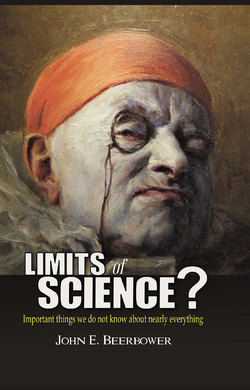Читать книгу Limits of Science? - John E. Beerbower - Страница 17
На сайте Литреса книга снята с продажи.
Some observations
ОглавлениеIn short, while we might support efforts better to understand and to systematize how we make valid inductive inferences, non-philosophers may have trouble taking too seriously Hume’s circularity argument with respect to justification for induction. Lipton stated the issue as follows: “In short, induction will work because it has worked. This seems the only justification our inductive ways could ever have or require. Hume’s disturbing observation was that this justification appears circular, no better than trying to convince someone that you are honest by saying that you are.” Inference to the Best Explanation, p.10. But, is that really a fair analogy? Is it not a more apt comparison to look at someone trying to convince another that he is honest and will continue to be so by pointing to a track record of honest behavior?
As discussed below, Sir Karl Popper criticized the notion that successful predictions prove the correctness of a theory. He allowed that success constituted corroboration (a kind of confirmation), but he recognized that there could be an abundance of rather trivial corroborations that should give rise to little confidence in the theory and that, more importantly, no amount of corroboration could ever conclusively establish that the theory was an accurate reflection of reality. Thus, he asserted that the real essence of the scientific method was (or should be) the seeking of refutation of theories (disconfirmation) through falsification. Then, it is the success of a theory relative to its competitors in that process of attempted refutation that constitutes a basis for belief in the theory. One consequence of this reformulation of the process of scientific inquiry was believed by Popper to be the elimination of the “problem” of induction by the elimination of inductive inference in the process of testing theories. Popper, The Logic of Scientific Inquiry (1959), pp.27–34.
Here the questions become how to test or assess theories and how to choose among them. Thus, we are simply back to the discussion of theories and how they can be tested that we were discussing above. The problem of induction is the problem of scientific inquiry and understanding.
Hume argued that simple induction was the only way in which man interpreted and understood the world. I am suggesting a somewhat different view. I can assume that early man’s efforts to comprehend the world and survive were based upon simple induction—the observation of apparent patterns and the conclusion that they were likely to be repeated. That conclusion is reasonable when choice or action is required. For example, take the mouse that twice discovers food in a particular place. Next time the mouse is hungry should it go back to that place or try someplace new? Is it not “rational” to try first the place of previous success? Of course, if that place is not productive, then the mouse presumably would try elsewhere, perhaps at random.
But, mankind has been functioning in a much more complicated fashion for millennia. Apparent patterns are observed. Efforts to construct theories of cause and effect are made. Those theories then are tested and, thereafter, eventually revised or replaced. Certainly, scientists today do not simply look for patterns and then make inferences; although, that is undoubtedly part of what they do. I suspect that many discoveries are the result of manipulating existing theories and playing with new ones, or simply indulging guesses and imaginative speculation.
Inductive reasoning undoubtedly has and does play a role in the generation of discoveries, but it cannot be the basis of scientific understanding. It is a tool for making educated guesses—sometimes for pragmatic reasons (like in the search for food), sometimes for intellectual ones (like in the formulation of new theories or revision of old ones). Its record of success in this process is a justification for its continued use. The inference being made is simply that the apparent regularities are potentially fruitful areas for exploration and theorizing.
